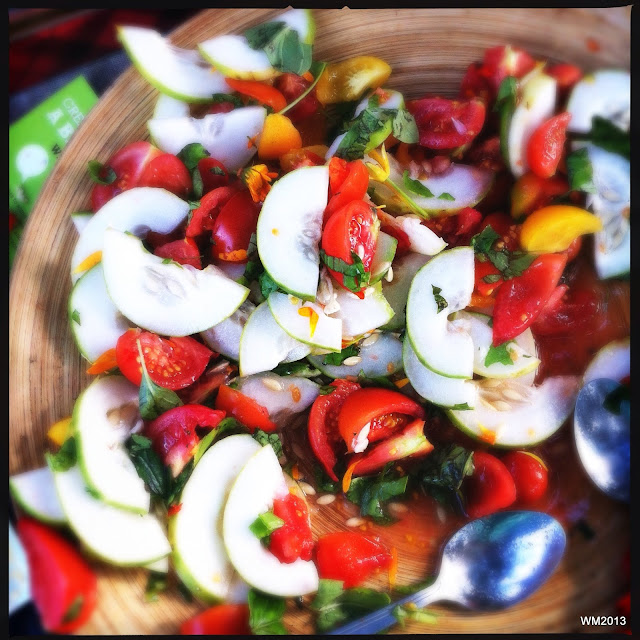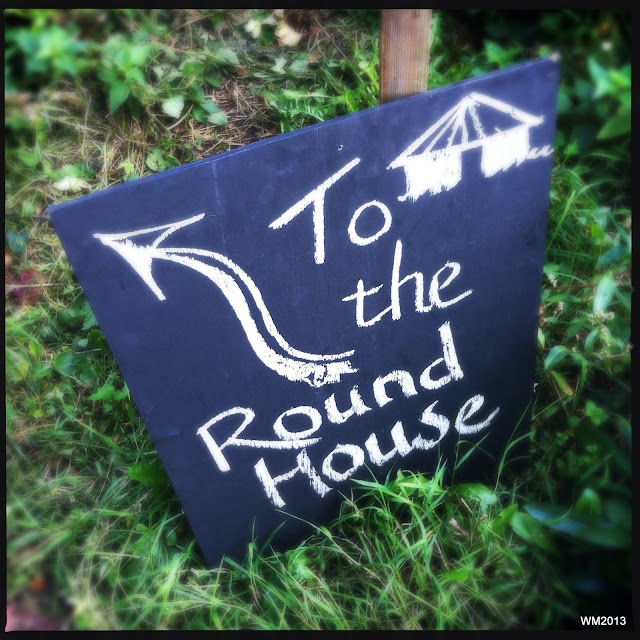Feed Bristol , based in Stapleton, is a food growing project run by
Avon Wildlife Trust. It promotes health, well-being and supports diverse community groups to learn about food provenance and reconnect with nature. Manned by two full-time members and a band of volunteers, they are steadily turning a plot of disused and derelict land over to food production and, regularly open their gates to the public to showcase their work -aiming to get more people involved. On a day that felt like the dying embers of summer, Feed Bristol held a series of lectures on the theme of Food and Land Gathering with the
Bristol Food Network and the
Blue Finger Alliance. Intrigued, I went along for a spot of lunch, a snoop and to catch the last lecture of the day -'Bringing the City Back to the Land'.
Under the boughs of an apple tree heavily laden with fruit,
The Market Kitchen had set up their field kitchen; steaming mussels over a wood fire, roasting sweet corn, cooking pumpkin gnocchi or ladling out portions of vegetable stew. Next to them, apples were being gathered and pressed, with barrow loads of spent pulp wheeled over to compost. Sun drenched with blue skies, I took a tour of the poly-tunnels; container garden; herb knot and roundhouse before sitting amongst bright-eyed, leggy Cosmos to hear the afternoon's speakers.



Food security is something that I have heard debated at an international level; the rights and wrongs of various governments buying up large chunks of arable land in places like Argentina, Gabon, Liberia and Tanzania to provide staples and biofuels for their own countries, whilst displacing the needs of the host country. At the local level, this is not something I'd really considered, but dependence on oil in the face of fossil fuel depletion, in a country which imports 40% of its annual food requirements -most of this fruit and veg, will of course have an impact. How do we then, go about making a city such as Bristol, its institutions and households, resilient and secure when it comes to food?


As well as changing food culture and safeguarding diversity, one of the key approaches to making Bristol a resilient city is by increasing urban food production and safeguarding land for food growth. The
Blue Finger Alliance which originally piqued my interest turned out to be a collective of organisations, businesses and individuals working together to protect a tract of grade 1 agricultural land known as the Blue Finger. Approximately 20km in length and 500m wide, this top quality soil, denoted bright blue on an agricultural land map is rare and projects finger-like from the centre of Bristol into South Gloucestershire. Once home to Bristol's numerous market gardens and pasture land, it is now bisected by the M32, with the M4 perpendicular. Much of the land lies unused, with plans for a park and ride scheme to remove yet another swathe from potential food production.

Revaluing and reclaiming this land to maximise local food production, could be a step in the right direction. Growing projects such as Feed Bristol and
Sims Hill -a co-operative who grow and supply food for their members, are working a small proportion of this land but have seen bumper crops over a short period of time, despite periods of difficult growing conditions.

Food waste was another area that was highlighted -not just recycling and composting of used food matter, but the tonnes of food that is wasted at production, processing and during retail. Many of us will be guilty of over buying fresh produce and letting it spoil, whilst others will be guilty of paying heed to best before dates and throwing out food that remains perfectly edible. Groups like
Feeding the 5000,
FareShare and companies such as
Rubies in the Rubble highlight the problem of surplus food in the retail sector still fit for human consumption which goes to waste on a daily basis. An aspect of waste that I had little awareness of was that during production itself. Factors such as automated harvesting, selective harvesting, quality and appearance standards mean that some produce is never picked at all.

Gleaning, a practice centuries old, is the collection of left over crops from farmer's fields after harvest. Until the Eighteenth Century, gleaning was a legal right for small-holders and cottagers in England, but bills passed to protect private land from the attention of scroungers (the origin of this term), meant the practice all but died out. In the modern era, gleaning is being used to prevent tonnes of fruit and vegetables, either from over production or the strict cosmetic standards of supermarkets from going to waste. At the invitation of farmers, networks of volunteers glean produce to redistribute to charities such as
FareShare and the
Best Before Project, helping those in need obtain fresh produce to incorporate into their diet. Bristol, I learnt, now has a group that is part of the
Gleaning Network and are aiming to organise regular events in the region with the help of enthusiastic volunteers.

Finally, increasing market opportunities was another aspect discussed. Bristol has approximately 70 supermarket outlets -from superstores to smaller 'local' stores. These account for 1.5% of Bristol's food businesses, but are where the majority of food shopping takes place. In many areas of the city there a few alternatives to shop; traditional independent greengrocers for example have disappeared from a number of local high streets. Sadly it is the less affluent and deprived parts of the city that have the least amount of choice for food shopping, compounded by calorie dense foods often being cheaper to buy than fresh produce in supermarkets. Supporting community initiatives in such areas is a key to change: establishing local markets; affordable community veg box schemes and organising food buying groups to improve local buying power -something that
Food Trade can help co-ordinate.

Yes, Bristol has a burgeoning food scene and great choice for those like me who like to eat, but there is also a large scene trying to address food poverty, food provision and sustainability. I'm ashamed to say until this October, I knew little about it. With more people taking interest, raising awareness and volunteering, perhaps Bristol can turn itself into the Green, Sustainable and Resilient city that it ultimately wishes to be. With so many exciting opportunities, are you ready to join in?